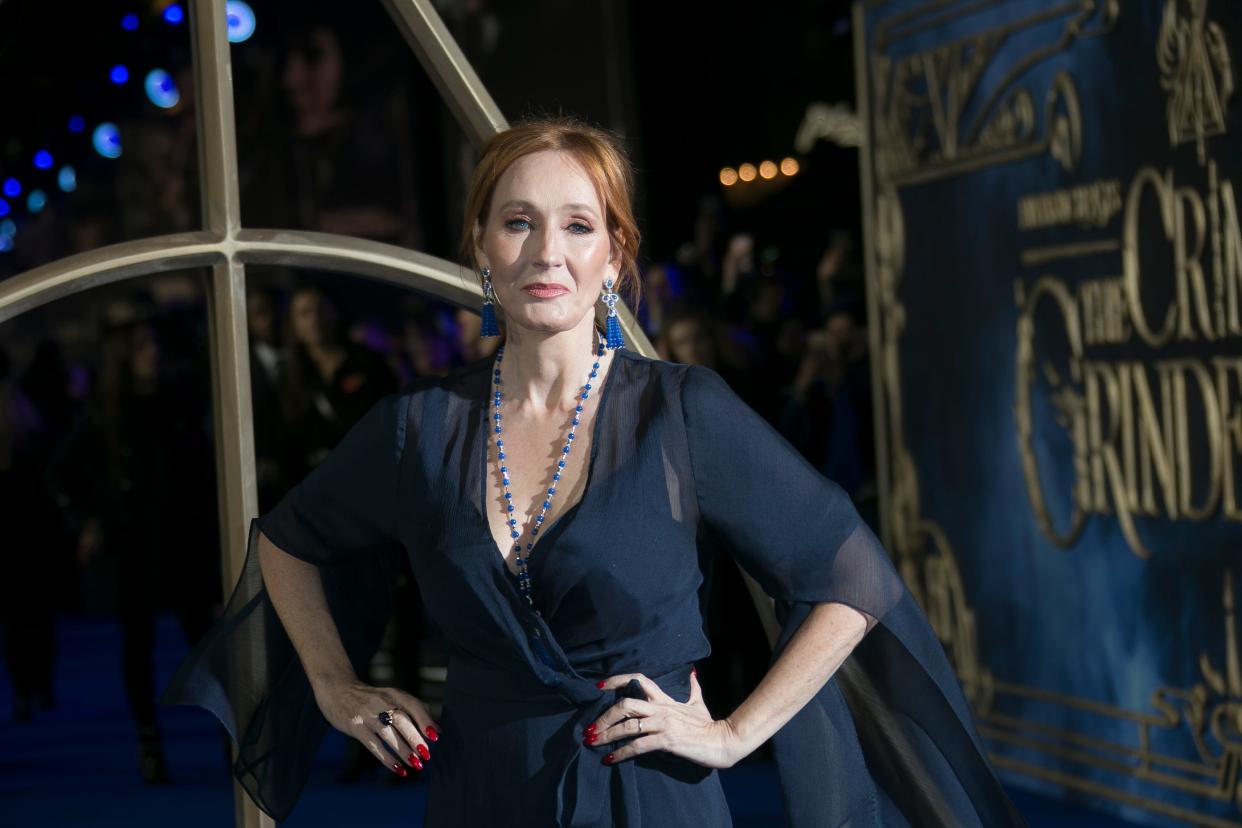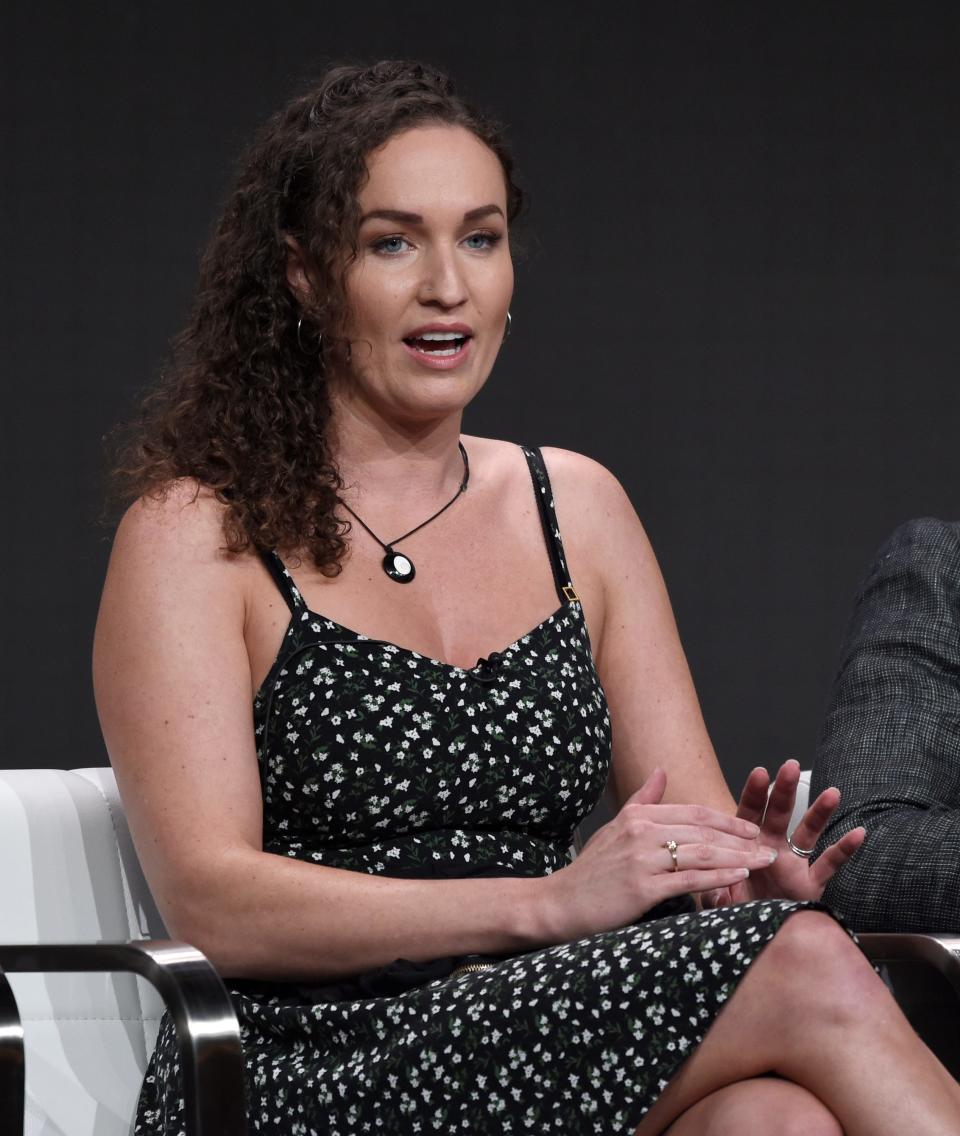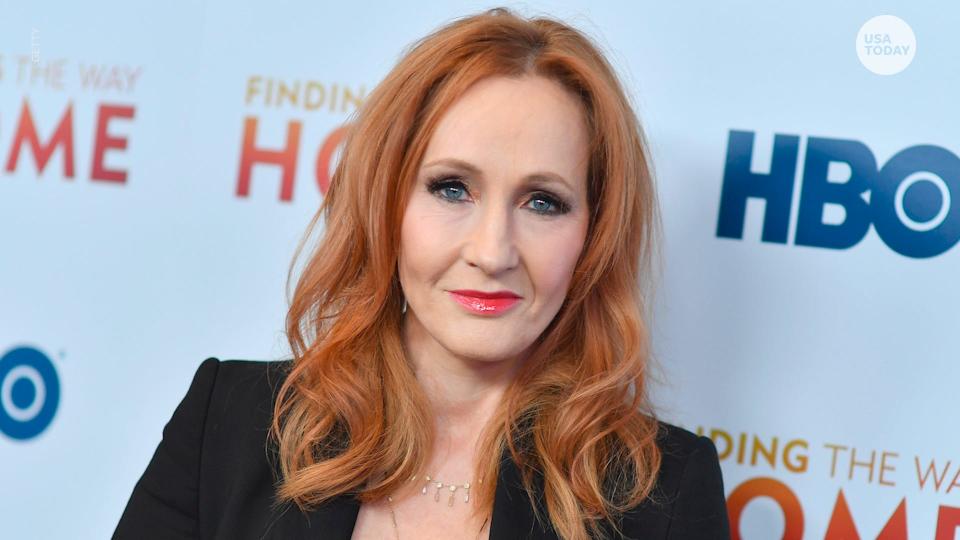How a former Westboro Baptist Church member interviewed J.K. Rowling for 'witch trial' podcast

- Oops!Something went wrong.Please try again later.
- Oops!Something went wrong.Please try again later.
Megan Phelps-Roper got a big surprise when she wrote to famed "Harry Potter" author J.K. Rowling asking to be allowed to interview her.
Rowling was already very familiar with Phelps-Roper, and in a good way.
She had read the book Phelps-Roper wrote about her experiences being a member of Topeka's anti-gay Westboro Baptist Church, then leaving that congregation.
Rowling had received that book as a gift. It was published in 2019 and was titled "Unfollowed: A Memoir of Loving and Leaving the Westboro Baptist Church."
Rowling speaks with 'unprecedented candor and depth' on 'Witch Trials' podcast

The resulting six-day interview between Rowling and Phelps-Roper is among ingredients of a podcast called "The Witch Trials of JK Rowling," which became publicly available this week.
The production's first two episodes went online Tuesday and the other five will be released later.
The podcast is put out by a Washington, D.C.-based, nonprofit media advocacy group called The Free Press, Phelps-Roper said on Twitter.
According to a website promoting the podcast, it "examines some of the most contentious conflicts of our time" through Rowling's life and career.
"In conversation with host Megan Phelps-Roper, J.K. Rowling speaks with unprecedented candor and depth about the controversies surrounding her — from book bans to debates on gender and sex," the site says. "The series also examines the forces propelling this moment in history, through interviews with Rowling’s supporters and critics, journalists, historians, clinicians, and more."
In the first episode, Rowling speaks more personally than she has in recent years, during which many of her public interviews have focused on her views against transgender people. Rowling speaks to what it was like in the years before and while she was writing the first book, as a woman who had recently lost her mother, lost an unborn child and divorced an abusive husband, before giving birth to a daughter and publishing the first installment in the series.
More:What is 'The Witch Trials of J.K. Rowling' and why is it controversial? We explain
Why did J.K. Rowling feel compelled to speak with Megan Phelps-Roper?

The promotional website notes that as Harry Potter became an international phenomenon in the 1990s, it drew a backlash from Christians in the U.S. who accused Rowling of "mainstreaming witchcraft and poisoning children's minds."
In recent years, Rowling has drawn criticism on social media for comments she made about transgender people. Critics of the author have called her a TERF, a term used for trans-exclusionary radical feminists who don't accept transgender women.
“If sex isn’t real, there’s no same-sex attraction," said one critic in a tweet posted in 2020.. "If sex isn’t real, the lived reality of women globally is erased. I know and love trans people, but erasing the concept of sex removes the ability of many to meaningfully discuss their lives. It isn’t hate to speak the truth.”
Harry Potter movie series cast members Daniel Radcliffe, Emma Watson and Rupert Grint subsequently all sought to distance themselves from her. The author was conspicuously absent from a television special last year to celebrate the 20th anniversary of the first film.
Radcliffe last fall wrote an open letter affirming that transgender women are women, and empathizing with fans of the series who have felt harmed by Rowling's comments.
"If these books taught you that love is the strongest force in the universe, capable of overcoming anything; if they taught you that strength is found in diversity, and that dogmatic ideas of pureness lead to the oppression of vulnerable groups; if you believe that a particular character is trans, nonbinary, or gender fluid, or that they are gay or bisexual; if you found anything in these stories that resonated with you and helped you at any time in your life — then that is between you and the book that you read, and it is sacred," Radcliffe wrote.
Rowling has denied being transphobic and has said she “knows and loves” trans people.
More:Megan Phelps-Roper shares journey from Westboro Church member to advocate for tolerance
Who is Megan Phelps-Roper?
Phelps-Roper grew up as part of Westboro Baptist Church, which consists mostly of extended members of the family of Fred Phelps, her grandfather, who died in 2014 at age 84.
Members since 1991 have carried signs bearing messages that include "God Hates Fags" while conducting anti-homosexual picketing in Topeka and other cities since 1991.
WBC drew increased attention about 20 years ago after it began picketing funerals of troops with signs contending they were dying because God is punishing the U.S. for its support of homosexuals.
Megan Phelps-Roper served as a spokeswoman for the church before leaving it in 2013, according to Capital-Journal archives.
Engaging on Twitter with people holding vastly different views was a driving force that helped Phelps-Roper make that decision, and also helped her develop compassion and understanding, she said during a 2018 appearance in Topeka.
J.K. Rowling's comments turned her into 'a kind of Voldemort'
Phelps-Roper is now 37, married with two children and living in South Dakota.
In an online article published Feb. 14 to promote the podcast, Phelps-Roper highlighted the influence Rowling had on her generation.
"J.K. Rowling is arguably the most successful author in the history of publishing, with the possible exception of God," she wrote. "And “Harry Potter” was a kind of bible for my generation. Since its publication beginning in the late ’90s, the series has taught tens of millions of children about virtues like loyalty, courage, and love — about the inclusion of outsiders and the celebration of difference. The books illustrated the idea of moral complexity, how a person who may at first appear sinister can turn out to be a hero after all."
But Rowling's comments since 2020 have turned her into a "kind of Voldemort — the villain of villains in her own stories," Phelps-Roper added.
She wrote: "The longer I watched the current controversy unfold, the more I wanted to understand: How did the people in these conflicts view what was happening? How did Rowling understand herself and her critics, past and present — and vice versa? Why had she chosen this hill to die on? And how had the conversation devolved so fully that it didn’t seem possible to have a productive conversation at all?"
So Phelps-Roper wrote to Rowling requesting an interview and explaining why she might be the right person to do it.
"Like Rowling, I knew what it was like to be an object of intense hatred," she wrote. "But I also knew the value of good-faith conversation, and the role it can play in bridging even the deepest divides."
Phelps-Roper's letter to Rowling she was “worried about what social media is doing to public discourse, by incentivizing extremes."
Phelps-Roper traveled to Rowling's 17th-century stone house at Edinburgh, Scotland, where they talked for six days.
"Toward the end of our conversations, I spent a long time talking with @jk_rowling about discernment," Phelps-Roper wrote Feb. 14 on Twitter. "About how a person can ever know if they’re standing up for what’s right — or joining a moral panic. I think you’ll be surprised by the thoughts she shares."
At the beginning of the episode, Rowling explains that she doesn't understand critics' opinion that she has ruined her legacy by speaking out against transgender rights.
"You could not have misunderstood me more profoundly," Rowling said on the episode. "I do not walk around my house thinking about my legacy. What a pompous way to live your life thinking about what my legacy will be. Whatever! I'll be dead. I care about now, and I care about the living."
J.K. Rowling podcast asks viewers to question who is witch and who is mob
The "Witch Trials" podcast also includes conversations with Rowling's critics and others regarding transgender-related issues, Phelps-Roper wrote in promotional materials.
She wrote: "I’ve spent the better part of the past year speaking with people on all sides of this conflict: trans adults, teens, clinicians, and advocates; historians, reporters, authors; Christians who boycotted Potter in the 1990s; doctors, lawyers, and even experts on witch trials."
Phelps-Roper doesn't pretend to have answers to the deep questions at the heart of the "Witch Crimes" series. In framing the series, she includes snippets of interviews with transgender advocates and experts who have condemned Rowling's views that will likely feature in future episodes.
"One of the things that stood out to me is how people on all sides of the conflict felt so under attack, so threatened, that the invoked the language of witch hunts, even as they vehemently disagreed on who was the witch — and who was the mob," Phelps-Roper says in the first episode.
Contact Tim Hrenchir at threnchir@gannett.com or 785-213-5934.
This article originally appeared on Topeka Capital-Journal: J.K. Rowling, ex-Westboro Church member Megan Phelps-Roper in podcast

